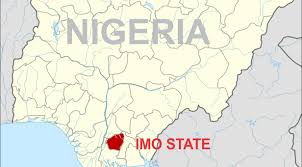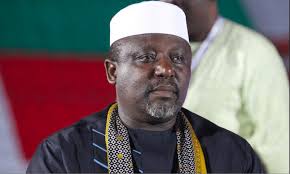The late Enebeli Enebuwa, alias Andrew the checkout man, was the talk of the country thirty-something years ago. He had acted in a video meant to campaign against the rate at which Nigerians were checking out of their country for other nations in search of greener pastures.
In the video that was constantly played over the Nigerian Television Authority (NTA) before or after the popular 9pm national news, then, the character Andrew complained bitterly about the woes of the country – irregular electricity supply, water shortage, poor housing, bad roads, name them, and finally bellowed in the American accent, “meeen, I’m checking out!”, meaning that he was running away from the country. Someone else drew him back by the shoulders, appealing to him to stay back and help build the country.
The frequency of Nigerians’ flight to other countries has been on the rise for generations. Before the checking-out era, Nigerians merely travelled abroad for studies and rushed back home to contribute their quota to national growth. That was before the war and some years after. In more than 30 years, successive governments have been unable to remedy the situation as the state of the nation has continued to dip economically, socially, and most disgustingly, politically. Subsequently, majority of Nigerians have become even more desperate to run out of the country while the wise ones who returned earlier have since gone back to foreign lands and formed the bulk of our folks in the Diaspora.
This class cuts across all professionals; medical personnel, engineers, lecturers, and various artisans who would have been useful to the intrinsic growth of the nation, except, perhaps, career politicians who hit it here, move their illicit proceeds abroad and return for more exploits.
Being the giant of Africa, both in size and resources, Nigerian which is home to more than 200 ethnic nationalities, ought to be of international concern, more so that globalisation has caught up with even the smallest of nations in the world. Institutionalised corruption in the country has led to the depletion of jobs just as bad government policies have rendered the environment less conducive to business, resulting in a rising poverty rate.
Of utmost concern is the security situation in the country. The territorial Nigeria is under the invasion of terrorists wanting to seize the land and install whatever radical government they may wish. Some of the terrorists, now romantically called bandits, cause confusion and feed from it, with their grand masters that include dubious Nigerians and their foreign partners. Alien herdsmen pick up their guns and harass natives in their villages, trying to seize their lands. And government gleefully declare their citizens internally displaced persons. It does nothing to reclaim the land and return the people to their ancestral abodes. It is envisaged that should there be a major crisis in the country, no other nation would be able to contain the volume of refugees that would pour out of Nigeria.
The grim situation should stir up concern, especially among the Nigerians in the Diaspora. One is, however, yet to understand what informed the behaviour of Ahmed Idris Wase, deputy speaker of the House of Representatives, the day he halted Mark Gbillah, representing Gwe East Federal Constituency, when he attempted to present a petition to the House on behalf of the Mutual Union of Tiv in America (MUTA), a group made up of Nigerians of the Tiv origin in the Diaspora.
Wase, in the video that went truly viral at that time, hushed Gbillah who was to present the petition bordering on the displacement of indigenous Benue people from their land, insisting that they had no right to talk about what’s happening at home.
Wase got the backlash that made him deny what was on video. MUTA in a statement after the deputy speaker’s faux pas, reminded him that in 2019 Nigerians residing abroad contributed approximately $23.5 billion to the Nigerian economy in the form of direct business investments and remittances back to their families to help pay for hospital bills, education, and basic amenities like water, energy, food, and security.
To buttress the significance of the contributions that Nigerians abroad make to the Nigerian economy, MUTA further pointed out that, in 2018, Diaspora remittances translated to 83% of the federal budget, and was 11 times the Foreign Direct Investment (FDI) inflows.
“In essence, Nigerians abroad are greatly subsidizing the federal budget yearly. These are the groups of Nigerians that Mr. Deputy Speaker of the Federal House of Representatives argues do not have a right to make a petition to the House”, MUTA stated.
The organisation further lampooned Wase and those thinking along that line, adding that “In a functioning society, the Nigerian government ought to have been providing these services, obviating the need for Nigerians abroad to sacrifice their hard earned and sometimes meagre salaries.
Most, if not all Nigerians in the Diaspora, hold dual citizenships. This is an indication that they still have their minds at home and are interested in the affairs of their kith and kin, even though they are not physically present among them, just as the MUTA concern has shown. In other words, they hope to return to enjoy the sweet village life they were used to before living the shores of the country.
To preserve this, they must, at all costs, put pressure on the international community to be positively interested in Nigeria and its wellbeing. They must not sit in their comfort zones and forget the plight of people at home. It does not end at sending money home. It is expected of them to make powerful representations to respective countries to take interest in quietening their home, because east or west, home is the best.
The plethora of problems besetting Nigeria can only be resolved with correct politics. It is imperative that Nigeria must embrace the principles of true federalism for there to be peace. Although globalisation has succeeded to an extent in breaking socio-cultural barriers among the people of the world, it is unlikely to erase territorial boundaries as man, by nature, is territorial, no matter how much he desires communalism.
That is why it is usually said that the right of someone to swing hands ends at the point another person’s nose begins. Had Britain created countries along the rigid lines of ethnic affinity, just as they did in southern Africa when they pulled out, Nigeria would not have been in this state of flux. However, the size of the country can be turned into an advantage, especially if it is modelled after world’s popular federations and republics such as the United States of America, the United Kingdom, Switzerland, among others.
It is expected that true Nigerians in the Diaspora should persuade the world to talk about Nigeria with a view to instituting a truly federal system that fits its unique diversity. This persuasion is necessary and the world powers should buy into it to absolve themselves of complicity in the country’s woes.
As a matter of fact, international pressure on managers of the country is capable of changing the predatory dot-in-a-circle mentality that is pervasive among rulers so that the big circle would not swallow the tiny dot (courtesy, President Buhari) or get choked in an attempt to do so.
Dr. Odu can be reached through dirimrich2018@gmail.com









